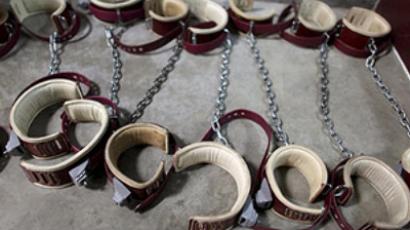Latvia equates Stalinism and Nazism
Russian and Jewish groups have hit out at a new Latvian national holiday that commemorates the victims of Stalinism and Nazism on the same day.
The Museum of Occupation of Latvia complains it does not have enough space for all its exhibits. Especially now that the country's parliament has passed a new law to recognize the common legacy of Nazism and Stalinism and to commemorate their victims on the same day.
It's something the museum had long been calling for and now it feels officially justified in putting the portraits of Hitler and Stalin together.
“The countries at that time were both totalitarian, there was only one party ruling in each of the countries. There was no freedom of speech, nor freedom of thought. There were severe repressions,” explains Danute Dura from the Museum of Occupation of Latvia.
Anti-fascists in Latvia condemn the new law as outrageous, calling it a pure rewriting of history. They say it is part of a broader confusion over the legacy of World War Two.
RT caught up with Eduard Goncharov from the Latvian Anti-Fascist Committee at a military cemetery in Riga.
“European diplomats and the President of Latvia come to the cemetery on state holidays. The most dreadful thing about this place is that two central tombs belong to the chief of the SS-division, like that of colonel Weiss,” says Eduard pointing out at the place. “He was one of the organizers of the Holocaust and other mass murders. And now children in Latvia lay flowers on his tomb. We are fighting the idea, but we haven't succeeded yet.”
It's not only in Latvia where anti-fascists are losing ground. No one has been punished in independent Lithuania, Latvia or Estonia for Holocaust crimes.
Meanwhile veterans of the Waffen SS-division – a former organ of the Nazi party – feel quite free to hold public gatherings which are funded by the state.
Eduard told RT about one such meeting in neighboring Estonia. An event he couldn’t attend as he, along with other antifascists, is blacklisted.
And indeed, on arrival in Estonia RT found on the morning of a seemingly peaceful gathering, two Russians had been arrested.
To get through to an SS-gathering, the RT crew avoided speaking Russian. The language is not welcome in Estonia. Modern books and the media say that just like the USSR, today's Russia presents a threat to the Baltic nation and youngsters learn this lesson quickly.
Unlike Estonians, those living in Latvia say they are not obsessed with winning anything back from Russia.
But the 23rd of August will be the moment of truth. Many fear that the new date on the calendar will lead to fierce clashes between the two ethnic communities which so far have been living peacefully side by side.
Read also Russia's Foreign Ministry: USSR was not Nazi clone













